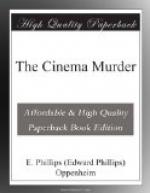“That so?” the detective observed, with quiet sarcasm. “You seem to have a knack of making friends pretty easily, Miss Wenderley.”
“It is not your business if I have,” she snapped.
“Well, we’ll pass that, then,” he conceded. “I haven’t quite finished with you yet, though. There are just one or two more points I am going to put before you—and this gentleman who is not Mr. Douglas Romilly,” he added, with a little bow to Philip. “The first is this. There is one fact which we can all three take for granted, because I know it—I can prove it a hundred times over—and you both know it; and that is that the Mr. Merton Ware of to-day travelled from Liverpool on the Elletania as Mr. Douglas Romilly, occupied a room at the Waldorf Astoria Hotel as Mr. Douglas Romilly, and absconded from there, leaving his luggage and his identity behind him, to blossom out in an attic of the Monmouth tenement house as Mr. Merton Ware, a young writer of plays. Now I don’t think,” Mr. Dane went on, leaning a little further over the table, “that the Mr. Douglas Romilly who has disappeared was ever capable of writing a play. I don’t think he was a man of talent at all. I don’t think he could have written, for instance, ‘The House of Shams.’ Let us, however, leave the subject of Douglas Romilly for a moment. Let us go a little further back—to Detton Magna, let us say. Curiously enough, there was another young man who disappeared from that little Derbyshire village about the same time, who has never been heard of since. His name, too, was Romilly. I gathered, during the course of my recent enquiries, that he was a poor relation, a cousin of Mr. Douglas Romilly.”
“He was drowned in the canal,” Beatrice faltered. “His body has been found.”
“A body has been found,” Mr. Dane corrected, “but it was in an unrecognisable state. It has been presumed to be the body of Philip Romilly, the poor relation, a starving young art teacher in London with literary aspirations—but I hold that that presumption is a mistake. I believe,” the detective went on, his eyes fastened upon Philip, his voice a little raised, “that it was the body of Douglas Romilly, the shoe manufacturer, which was fished out from the canal, and that you, sir, are Mr. Philip Romilly, late art-school teacher of Kensington, who murdered Douglas Romilly on the banks of the canal, stole his money and pocketbook, assumed his identity in Liverpool and on the Elletania, and became what you are now—Mr. Merton Ware.”
Philip threw away the cigarette which he had been smoking, and, leaning over the box, carefully selected another. He tapped it against the table and lit it.
“Mr. Dane,” he said coolly, “I shall always be grateful to you for your visit this morning, for you have given me what is the most difficult thing in the whole world to stumble up against—an excellent idea for a new play. Apart from that, you seem, for so intelligent a man, to have wasted a good deal of your time and to have come, what we should call in English, a cropper. I will take you into my confidence so far as to admit that I am not particularly anxious to disclose my private history, but if ever the necessity should arise I shall do so without hesitation. Until that time comes, you must forgive me if I choose to preserve a certain reticence as to my antecedents.”




